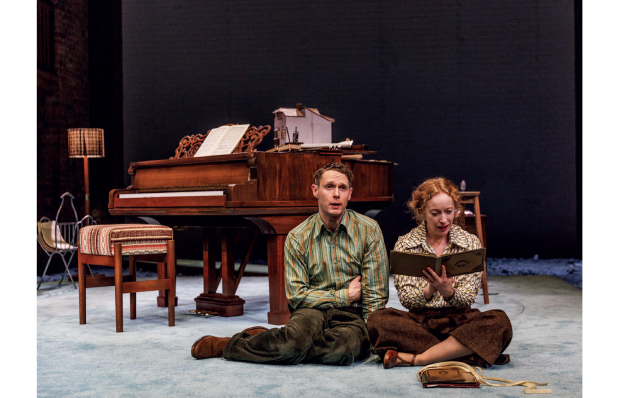Against by Christopher Shinn sets out to unlock the secrets of America’s spiritual malaise. Two main settings represent the wealthy and the dispossessed. At a university campus, an inquisitive Jesus-freak named Luke interrogates people about their experiences of violence. At an online retailer, oppressed wage slaves toil for hours and mate fleetingly during their tea breaks. Shinn’s characters also fall into two categories. The rich are eloquent, idealistic and disingenuous. The poor are earthy, impulsive and honest. The play is built around a series of formalised conversations, recorded interviews, writing tutorials, a Q&A session at a town hall, a stilted reunion between two old school-friends, and so on.
In ritualised dialogues like these, the characters must subordinate their real selves to the social conventions rather than expressing their true natures. And that, of course, is the opposite of a proper drama where transgression, jeopardy, unpredictability and impropriety are the key elements. So Shinn has accidentally written a script where the dramatic potential has been sucked out in advance. At the climax, a crazed gunman shows up at a warehouse but nearly all the characters avoid him by watching him over the internet. The characters, again, are being moved away from the source of conflict when they ought to be thrust towards it. Another blunder. Odder still, Shinn teaches playwriting at the New School. Perhaps he needs a refresher course.
But the real difficulty here is the protagonist, Luke. It’s hard to imagine a character farther removed from the life of the ordinary play-goer. Luke is a famous young tech billionaire with a lot of time on his hands, who claims that God has commanded him to ‘go where there’s violence’. So he sets out to explore the causes of a recent massacre and a rape epidemic. Fair enough. But would Mr Average ever find himself in that position? The more we learn about Luke, the creepier he becomes. He coldly listens as the beautiful Sheila tries to seduce him and he describes to her his preferred lovemaking technique. ‘I jerk off to you. I imagine you.’ She exits the room leaving him to thrash about on the pillows with one hand inside his Y-fronts and the other on the Bible. Very peculiar. When a distressed mother begs him to speak by phone to her hospitalised son, he says it’s not his ‘policy’ to chat with fans. Even if they’re dying, apparently.
What on earth attracted Ben Whishaw to this priggish tosspot? He tries to make Luke engaging but he has very little to work with and he’s outclassed for warmth and humour by Kevin Harvey, the show’s only asset, who plays a camp English professor. Whishaw is a rum property. He’s built up an amazing career from a handful of excellent qualities. His face is striking and mysterious, his voice is good but not exceptional, his physique is disappointing. On stage, there’s a stillness about him that divides opinion. Some call it ‘animal’. Others find it more ‘vegetable’. His best feature is his luxuriant black coiffure which, when mussed up, resembles the storm-tormented North Sea at midnight. He’s landed himself in a dreadful pool of stagnant chatter here. Avoid it. You’d have more fun watching jelly set.
The Majority isn’t a drama but a baffling one-man show by Scottish playwright Rob Drummond. He poses questions to audience members who are asked to vote Yes or No with electronic gadgetry. For adults this is rather old hat, but school kids might find the dilemmas interesting: would you kill an innocent bystander to save the lives of five railway workers?
Drummond became fascinated by public opinion during the Scottish referendum election in which he failed to vote. Then he tells us more. He travelled to a remote northern village at the behest of a friendly drug addict who persuaded him to chalk ‘Nazi Scum’ outside the home of a local councillor. Drummond knew nothing of the councillor and lived in a different constituency. Another time he got drunk at a rally in Glasgow and assaulted one of his opponents. He was convicted and given a suspended sentence.
But is this true? Or is it part of the act? He won’t tell us. (And the press office at the NT refused to clarify matters either.) To judge from Drummond’s twitchy body language and his casually violent rhetoric — he talks frequently of ‘punching’ those who challenge his views — he seems a genuinely ugly and aggressive character. Then again, if his criminal past is fictional what does he gain by posing as a thug on the stage of the National Theatre? There are two possibilities. Neither is very palatable. The NT has decided to give several months’ employment to a man who is either a fantasist or a fascist.
Got something to add? Join the discussion and comment below.
Get 10 issues for just $10
Subscribe to The Spectator Australia today for the next 10 magazine issues, plus full online access, for just $10.
You might disagree with half of it, but you’ll enjoy reading all of it. Try your first month for free, then just $2 a week for the remainder of your first year.














Comments
Don't miss out
Join the conversation with other Spectator Australia readers. Subscribe to leave a comment.
SUBSCRIBEAlready a subscriber? Log in